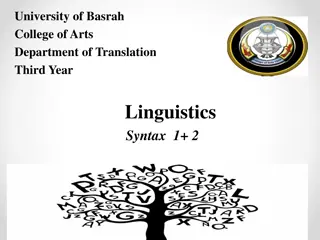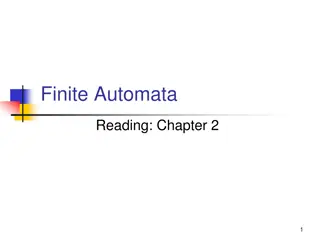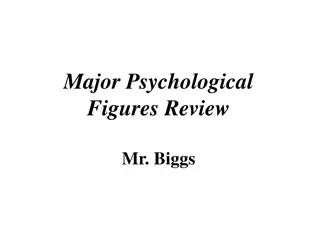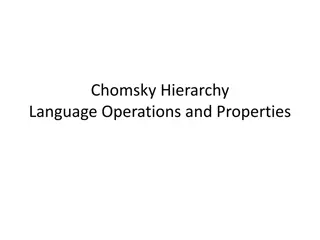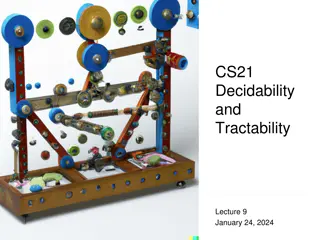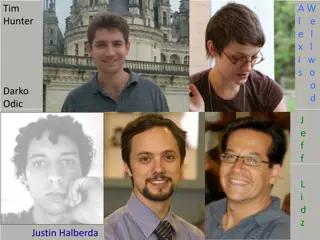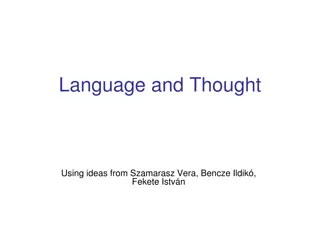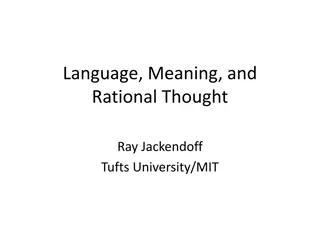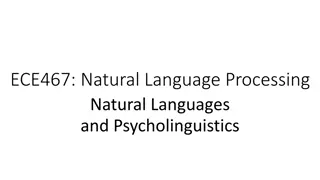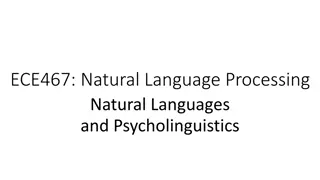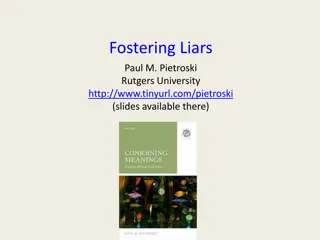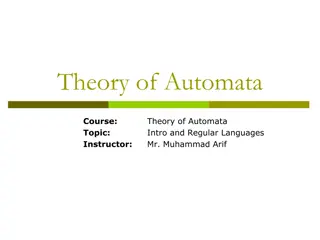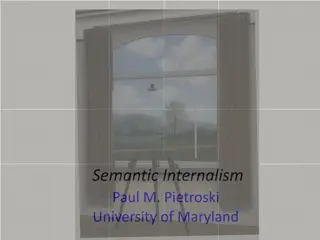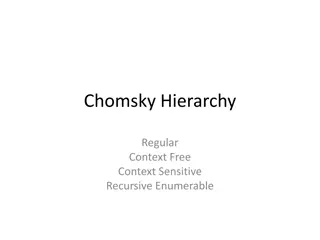Understanding Syntax in Linguistics
Syntax, originating from Greek meaning arrangement, deals with the structure of sentences in a language. Generative Grammar, coined by Noam Chomsky, uses rules akin to mathematics to create new, grammatically accurate sentences. By applying recursion and deep structure analysis, linguists explore th
2 views • 20 slides
Understanding Deterministic Finite Automata (DFA) in Regular Language Theory
An exploration of Deterministic Finite Automata (DFA) in the context of Regular Languages, covering their definition, functioning, application in recognizing input strings, and building a DFA for a specific language. The Chomsky Hierarchy and the significance of Regular Languages are also briefly di
0 views • 41 slides
Major Psychological Figures Review
Explore the significant contributions of major psychological figures such as Adler, Asch, Atkinson, Bandura, Beck, Binet, Cannon, and Chomsky. Delve into their theories on individual psychology, social conformity, memory storage, observational learning, cognitive therapy, intelligence, emotion, and
0 views • 57 slides
Understanding Chomsky Hierarchy in Language Theory
Explore Chomsky Hierarchy in language theory, including different types of languages, grammars, and automata. Learn how to prove if a language is regular, context-free, recursive, or recursively enumerable. Understand the closure properties of regular, context-free, recursive, and recursively enumer
2 views • 10 slides
Overview of Grammar Types and Chomsky Hierarchy
The four types of grammars are General, Context-Sensitive, Context-Free, and Linear grammars, each recognizing a specific set of languages. Chomsky Hierarchy categorizes these grammars into four levels, indicating subsets of languages they can recognize. Context-free grammars have specific productio
0 views • 17 slides
Understanding Decidability and Tractability in CS21 Lecture
Explore the concepts of decidability and tractability in the CS21 lecture on January 24, 2024. The lecture covers topics such as converting context-free grammars into Chomsky Normal Form, algorithms for determining language generation, worst-case running times, dynamic programming strategies, and de
3 views • 31 slides
Understanding Language and Slang in Human Communication
Exploring the fundamental concepts of language, slang, meanings, and their interconnections, with insights on the role of child-acquirable languages and Chomsky's I-Language theory. Discussions cover the nature of sentences, meanings, pronunciation-meaning pairs, and the generative procedures of sla
1 views • 57 slides
The Intriguing Relationship Between Language and Thought
Explore the fascinating connection between language and thought, delving into questions like whether one shapes the other, the impact of political correctness on our thinking, early experiments on language and cognition, word-finding difficulties, and differing perceptions of the world across langua
0 views • 44 slides
Automata Theory and Theory of Computation Overview
This course overview covers concepts in automata theory and theory of computation, including formal language classes, grammars, recognizers, theorems in automata theory, decidability, and intractability of computational problems. The Chomsky hierarchy, interplay between computing components, modern-
0 views • 42 slides
Exploring Language, Meaning, and Rational Thought in Cognitive Science
Dive into the intriguing realm of thought processes and inner speech as discussed by prominent scholars such as Plato, John B. Watson, Peter Carruthers, Noam Chomsky, and Ludwig Wittgenstein. Discover varying perspectives on how language intertwines with our conscious thoughts, challenging conventio
0 views • 111 slides
The Intriguing World of Language Evolution
In discussions encompassing universal grammar, pidgins, and creole languages, the fascinating exploration of language evolution unfolds. Chomsky's concept of universal grammar proposes inherent linguistic principles, sparking debate among scholars. Pidgins, emerging as makeshift jargons, highlight l
0 views • 18 slides
Language Development and Universality Explained Through Natural Language Processing
Chomsky's theory of Universal Grammar suggests an innate set of linguistic principles shared by all human languages, allowing children to learn language rapidly. Pinker's work delves into the existence and development of pidgins and creole languages, showcasing how languages evolve in unique circums
0 views • 18 slides
Understanding Languages and Meaning in Linguistics
The content explores the connection between languages, slangs, meanings, and pronunciations in human communication. It delves into theories by scholars like Davidson, Dummett, and Chomsky regarding the understanding and truth theories associated with languages and slangs.
0 views • 44 slides
Theory of Automata: Introduction and Regular Languages Overview
This course delves into the fundamentals of Theory of Automata, exploring topics such as regular languages, finite state models, grammars, Turing machines, and more. Instructor Mr. Muhammad Arif guides students through essential concepts like finite automata, pumping lemma, decidability, and Chomsky
0 views • 95 slides
Understanding Human Language: Connections and Meanings
Exploring the intricacies of human language, this content delves into the connections between signals and interpretations, emphasizing how languages facilitate boundless pronunciations to meanings and the unique acquisition process by children. It discusses Chomsky's concept of I-Language and the di
0 views • 45 slides
Exploring Chomsky's Language Hierarchy
Delve into the Chomsky Hierarchy, ranging from Regular Languages to Context-Free and beyond. Learn about Noam Chomsky's remarkable contributions to linguistics, philosophy, and more, as well as the properties and examples of Regular and Context-Free languages.
0 views • 22 slides
